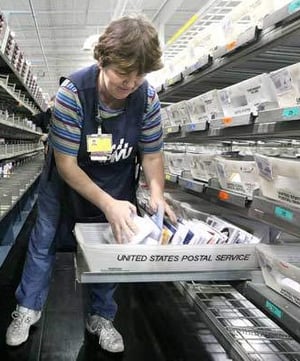
 A key component of creating printed materials is managing the mailing system that gets the brochures or flyers to the recipients. It’s a big percentage cost of a printing project. But mastering the intricacies of the mail stream can be complex and expensive.
A key component of creating printed materials is managing the mailing system that gets the brochures or flyers to the recipients. It’s a big percentage cost of a printing project. But mastering the intricacies of the mail stream can be complex and expensive.
Some print shops outsource this critical step and partner with an established mail services company, while others opt to bring the function in-house. Which is better? The answer is highly individual, based on the amount of mail you need to process, client requirements, and so on. It has to make business sense.
Factors Associated with In-House Mailing
Mailing involves researching, monitoring, and communicating the specifications for different postal products. Mailers have to be up to date on design rules, sorting tactics, and knowing how to get the best postage rates. Offering in-house mailing services for your clients requires expertise to buy and run mailing equipment.
You might consider the many reasons to bring the mail in-house. It can be a key revenue stream, for one. It gives your organization an expert knowledge base that supports your clients’ business more effectively and tightens the customer relationship. You can control your own processes, ensure consistent mail preparation to your own standards, and protect client data, especially if you’re dealing with sensitive information.
In-house service also reduces job processing and delivery times. And offering that one-stop shopping experience to clients can make you more valuable to them and less vulnerable to competitors.
Factors Associated with Outsourced Mailing
If you opt to work with a partner mail services company, keep some issues in mind.
Remember that outsourcing mailing services, especially if you manage the process for your client, does not absolve you of responsibility should something go wrong. If the mailing house makes an error or has a data breach, you’re still on the hook for the fallout.
Find a way of holding the mailing house responsible for data safety protocols and accountable if something goes wrong. The more critical the documents you manage, the more you must exercise control and oversight over the process.
 You’ll also want to assign someone to manage the mailing house relationship. Someone from your organization must establish lines of communications, vet the company, and set up protocols for handling materials. Before choosing a partner, you’ll want to assess their workflow, their financial stability, their expertise, and their equipment.
You’ll also want to assign someone to manage the mailing house relationship. Someone from your organization must establish lines of communications, vet the company, and set up protocols for handling materials. Before choosing a partner, you’ll want to assess their workflow, their financial stability, their expertise, and their equipment.
If a mail house meets your requirements, opting to outsource can be a wise choice. Mailing equipment can have a large footprint and the machines are highly specialized. By partnering with a mail house you won’t have to research the machines, manage the upkeep, devote space in your facility, or manage the overhead and staffing.
Neither will you have to worry about postal regulatory compliance and managing the relationship
Also on the plus side, a mailing house can offer services that maximize discounts. A mailing partner can score more presort discounts by aggregating mail from several sources, all bound for one zip code. You may get the discount even if your own concentrations are low with the USPS. Idle mail equipment won’t concern you. Inactive labor during down times, overtime. and other labor problems won’t be an issue.
Managing a mail operation is complicated, but if the fit is right, it can be a wise investment. An examination of your postage costs, costs of ownership, revenue forecasting, and opportunity costs is the start to making a decision about the best way to handle mail for your clients.
Gimbel & Associates can assess your business to help you decide if partnering or setting up an in-house mailing department is right for you.
- Categories:
- Mailing/Fulfillment - Postal Trends

In 2001, Roger Gimbel founded Gimbel & Associates, an international consulting firm providing business and market development services, skills training, and expert public speaking in the graphic communications and digital solutions industry. The mission of Gimbel & Associates is to help clients identify new business opportunities and implement leading-edge solutions using expertise in organizational development, technology selection, implementation, and work processes.
Roger oversees a team of Consultants with expertise in sales training, workflow analysis, MicroModeling, multichannel marketing, marketing plans, transactional printing, trans-promotional applications and creative strategies for mergers and acquisitions, business development workshops and seminars.











